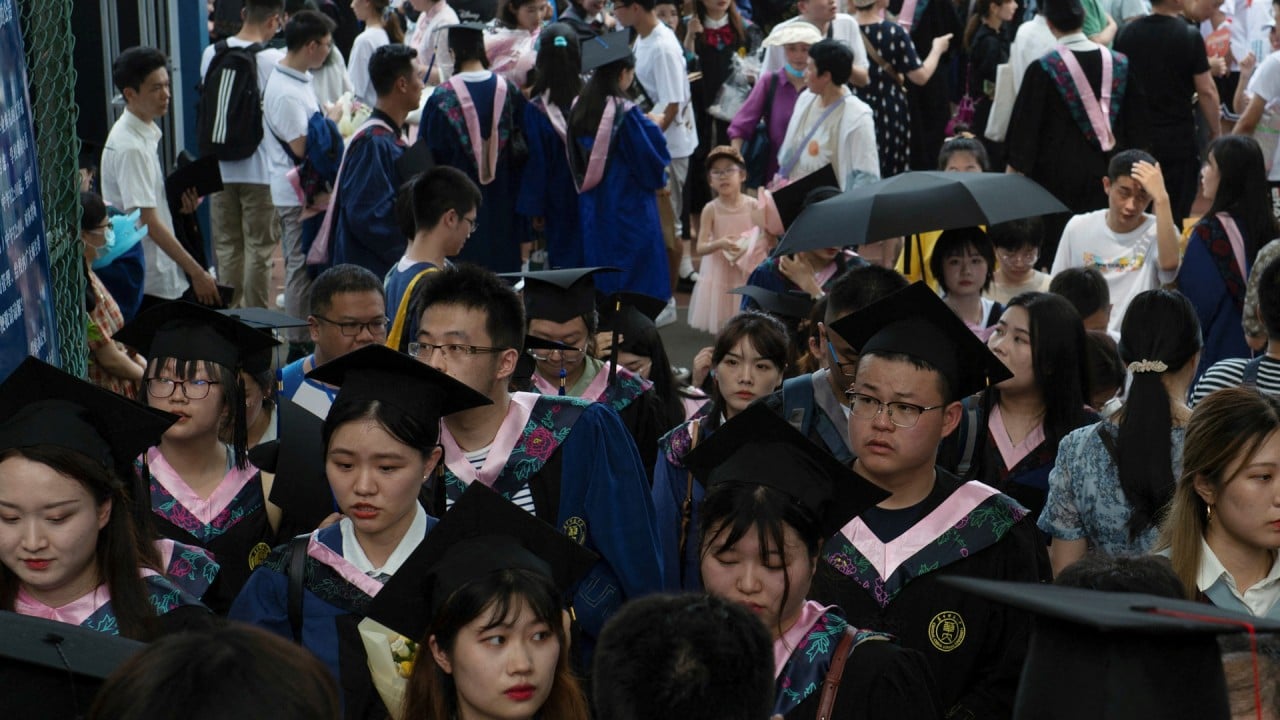As China’s heavily indebted municipalities grapple with worsening fiscal conditions, the so-called iron rice bowl of secure jobs at public sector or state-owned firms have started to crack in some less populous regions amid a scaling back of the civil service.
Institutional restructuring in Guzhang, a county of 143,000 in the central province of Hunan, could include consolidating and merging various administrative departments, while staffing levels could also be downsized.
“[The goal is to] optimise administrative service efficiency, alleviate fiscal support pressures, and direct limited financial resources towards ensuring and improving people’s livelihoods,” Shen Xiaoming, Hunan’s Communist Party secretary said last month.
Guzhang is the least populated county in the province, but it has a comprehensive administrative infrastructure and nearly 4 per cent of residents are civil servants, much higher than the provincial average.
Local finances are facing significant difficulties, and everyone is considering what to do next
But as debt mounts without reliable sources of revenue, the county heavily relies on transfers and payments from higher-level authorities, mirroring the predicament faced by other small counties.
“Due to the simultaneous downturn in the real estate sector and the national economy, local finances are facing significant difficulties, and everyone is considering what to do next,” said Peng Peng, executive chairman of the Guangdong Society of Reform, a think tank connected to the government in the southern province.
“Excessive expenses on meaningless pursuits further exacerbated the burden on public finances and the challenges of maintaining essential public services, the government is burdened by heavy debt and lacks a solid basis for increasing borrowing.
Advertisement
“Tax cuts during the pandemic also made it challenging to grow revenue in the short term.”
As governments are unlikely to make significant cuts to expenditure on essential public services, and while sustained investment growth is unlikely, “perhaps the only possibility is downsizing the government workforce by eliminating some redundant positions and unnecessary expenditures,” he added.
In 2022, Hunan’s outstanding local government debt accounted for 31.7 per cent of its gross domestic product, higher than the national average of 29 per cent, according to Everbright Securities.
According to a report published by financial news provider Caixin, some local governments are being forced to take out loans to pay public servants, while others are unable to make salary payments.
Advertisement
Provinces that received an increased quota of special-purpose bonds – used by cash-strapped local governments to raise funds, usually for large infrastructure construction projects – could also be required to cut public sector jobs by 20 per cent, Caixin added.
Working within the public sector may still offer stability, but the number of stable positions is likely to shrink, and compensation may decrease,
Xu Tianchen, an economist with The Economist Intelligence Unit, said iron rice bowl jobs could become less stable, with salaries and headcounts potentially reduced.
Advertisement
However, the streamlining of the public sector would not result in large-scale lay-offs, as “some people will be [taken care of] by early retirement, while others will be reassigned to lower levels of government departments”.
“Working within the public sector may still offer stability, but the number of stable positions is likely to shrink, and compensation may decrease,” Xu added.
A number of small counties in northwest Shanxi province, which took the lead in institutional reforms, have also been forced into changes, with some involving laying off more than a thousand civil servants.
The downsizing of local public services comes as debt-laden provinces grapple with a prolonged property slump, which slashed land sales, as well as years of overinvestment and the cost of the coronavirus.
Advertisement
In the first half of 2023, land sales – once a key source of revenue – fell by more than 20 per cent to 1.87 trillion yuan (US$255 billion).
“As China’s population continues to gravitate towards large cities and metropolitan clusters, many counties will face pressures for regional consolidation, organisational mergers, and downsizing, particularly those located far from major urban centres and lacking industrial foundations,” Xu added.
As long as the government stands, we have bread on the table
Beijing said in March that it would cut the number of positions within central government agencies by 5 per cent over the next year, paving the way for new departments.
Advertisement
“The economy is not doing well this year, the [private] companies could all disappear, but as long as the government stands, we have bread on the table,” said 27-year-old Rose Wu, a teacher in Wuhan, the capital of the central Hubei province.
Nearly 2.6 million signed up for the 2023 national public servants exam, the highest in nearly a decade.
But with only 37,100 positions available, in some cases, nearly 6,000 people would compete for the most popular positions.
The number of primary schools in China dropped by 3.35 per cent to 149,100 at the end of last year, while new enrolments sank by 4.55 per cent to 17 million.
The number of kindergartens also fell for the first time in 15 years in 2022.
Advertisement



